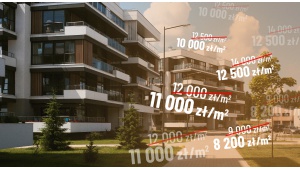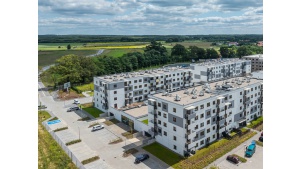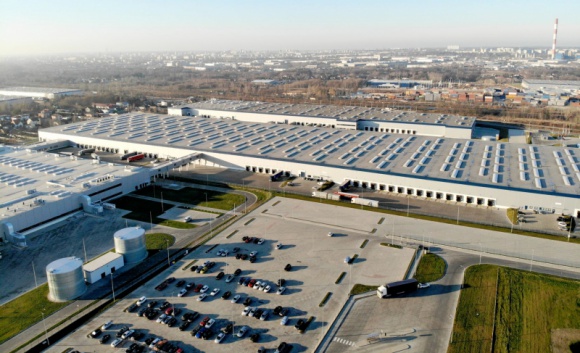New opportunities in European industrial and logistics sector
- Market fundamentals continue to support ‘Big Box’ logistics assets but investor demand has driven prime net initial yields to historically low levels
- Investors must diversify to mitigate risks of overpricing and in order to lever the full depth of the industrial and logistics market landscape
- Savills IM sees strong rationale for thematic investing in urban and last mile logistics, light industrial estates and cold storage that offer diversification opportunities and attractive risk return profiles
- ESG compliant assets are paramount to investors and occupiers alike
‘Big Box’ mainstream logistics assets continue to display strong fundamentals but with pricing pressures driving down yields and new themes emerging, other industrial subs-sectors now offer alternative opportunities to investors, according to a new report by Savills Investment Management (Savills IM), the international real estate investment manager.
The report, entitled Thinking outside big boxes, identifies opportunities in mainstream ‘big box’ logistics and warehousing. It says long term demand fundamentals, such as economic growth, trade volume, manufacturing output and retail sales, all continue to provide strong support for such assets, while their availability remains limited in major markets across Europe as vacancy rates near record lows. Online sales, a key demand driver for ecommerce-related ‘big boxes’, are expected to grow strongly and be a key driver for occupier demand.
Analysis by Savills IM estimates that demand for additional logistics space totalled more than 10 million sq m in Europe in 2020 alone and another 21 million sq m could be added by 2025.
But Savills IM urges caution because surging demand has forced yields down for ‘Big Box’ assets - prime net initial yields are currently at historically low levels of 3.5% to 4.0% and sometimes even lower in core European markets.
The report says urban and last mile logistics, light industrial estates and cold storage sub-sectors now offer investors diversification opportunities because they are benefiting from the long-term trend towards the faster movement of goods and supply constraints on urban land.
Alistair Ennever, Head of Logistics, Europe, Savills Investment Management, commented: “Secular economic, technological, consumer and demographic trends are bolstering the strong fundamentals that already exist in European industrial and logistics markets. The dynamic growth of e-commerce has been accelerated dramatically by the Covid-19 pandemic, boosting the success of the logistics market even further.
“For this reason, we continue to see value in buying and creating modern, flexible logistics and industrial facilities in the key hubs, though in a more selective manner. With yields at historically low levels, stock selection, rental growth and sustainability of income are now the most important factors for investors to consider.”
Andreas Trumpp, Head of Research, Europe, Savills Investment Management, commented: “Industrial and logistics is considered among the most exposed real estate sectors for environmental, social and governance credentials. We argue that, by prioritising ESG, institutional investors also have the potential to improve the underlying asset fundamentals and leap on significant commercial benefits.
“Aside from the ‘big box’ sector, emerging sub-sectors offer higher yielding alternatives and provide yield-enhancing and risk diversification for investors willing to take higher risks and engaging earlier in the product-cycle.”
Key points in the Savills IM report on the emerging sub-sectors include:
Urban and last mile logistics –Savills IM expects rental and land-value growth to be strongest in urban and city fringe locations due to an increasing scarcity of land and strong occupier demand for last-mile facilities close to end consumers. Savills IM estimates that the rental premium of urban industrial rents versus those of standard prime assets was 45% in 2020. Accessing assets in urban settings which possess the ESG characteristics that investors and occupiers are demanding is challenging. As such, a ‘build it rather than buy it’ may be required, which presents its own difficulties.
Light industrial estates – Typically less than 10,000 sq m in size and often located within urban boundaries where population growth and urbanisation are constraining supply. Having many small tenants on a multi-let estate requires greater asset management but it also increases the chances of securing tenants and reducing substantial void periods. There is potential in existing assets and redevelopment opportunities, despite the greater complexity and downside risks involved. Areas with demand-supply imbalances provide scope for rental growth, but location and stock selection are important.
Cold storage – This sub-sector has the potential to become a strong long-term opportunity underpinned by solid fundamentals and steady inter-cyclical demand. In addition to traditional grocery retailers ramping up their online activities, new online grocery platforms have emerged while the public health emergency has led to a global surge in demand for medical supplies that require refrigeration. The European cold chain logistics market was worth US$75 billion in 2019 and Savills IM estimates that its value will reach US$113 billion by 2025, indicating growth of more than 8% per annum. The most attractive facilities are located close to large European metropolitan areas.

Deweloperzy ukrywają ceny mieszkań. Z troski o klientów czy swoje portfele?

Więcej przestrzeni, mniej hałasu – dlaczego Polacy coraz częściej wybierają przedmieścia?

Jak czytać rzuty mieszkań i uniknąć przykrych niespodzianek? AI ułatwia wybór
Więcej ważnych informacji
 Jedynka Newserii
Jedynka Newserii

 Jedynka Newserii
Jedynka Newserii

Ochrona środowiska

Rozszerzenie UE wśród priorytetów duńskiej prezydencji. Akcesja nowych państw może mieć znaczenie dla bezpieczeństwa i gospodarki
Wraz z czerwcem kończy się druga polska prezydencja w Radzie Unii Europejskiej. W ciągu sześciu miesięcy instytucja ta pod przewodnictwem Polski podejmowała działania na rzecz bezpieczeństwa, w wielu wymiarach: zewnętrznym, wewnętrznym, informacyjnym, ekonomicznym, energetycznym, żywnościowym i zdrowotnym. Przede wszystkim doprowadziła do przełomowego wzrostu wydatków UE na obronność. Od 1 lipca pałeczkę przejmują Duńczycy, którzy zwrócą uwagę m.in. na obronę Bałtyku.
Transport
Ruszyła ważna inwestycja przemysłowa w województwie opolskim. Powstanie tu centrum logistyczne dla giganta motoryzacyjnego

Nowe regionalne Centrum Kompletacji i Dystrybucji, które powstanie w parku logistycznym i produkcyjnym Prologis Park Ujazd w województwie opolskim, będzie związane z rynkiem automotive aftermarket, konkretnie kompletacją i dystrybucją zestawów naprawczych dla branży motoryzacyjnej. Obiekt będzie służył firmie Schaeffler, a za jej budowę odpowiada Prologis. Jak podkreśla jego przedstawiciel, będzie to budynek niezależny od paliw kopalnych bezpośrednio dostarczanych do budynku i wyposażony w wiele rozwiązań prośrodowiskowych.
Konsument
Konsumenci rynku telekomunikacyjnego narzekają na nieprzejrzyste oferty. Jeden z operatorów chce je wyeliminować

Co piąty Polak dostrzega pozytywne zmiany na rynku usług telekomunikacyjnych, głównie jego rozwój, zarówno pod kątem liczby ofert, jak i rozwoju technologii. Gorzej jednak wypada przejrzystość ofert – wynika z badania Urzędu Komunikacji Elektronicznej. Konsumenci są zmęczeni skomplikowanymi taryfami i ukrytymi kosztami, dlatego coraz większym zainteresowaniem cieszą się proste pakiety. Dlatego też T-Mobile startuje z nową ofertą „Po prostu", z jednym, prostym abonamentem bez żadnych limitów.
Partner serwisu
Szkolenia

Akademia Newserii
Akademia Newserii to projekt, w ramach którego najlepsi polscy dziennikarze biznesowi, giełdowi oraz lifestylowi, a także szkoleniowcy z wieloletnim doświadczeniem dzielą się swoją wiedzą nt. pracy z mediami.








.gif)

 |
| |
| |
|